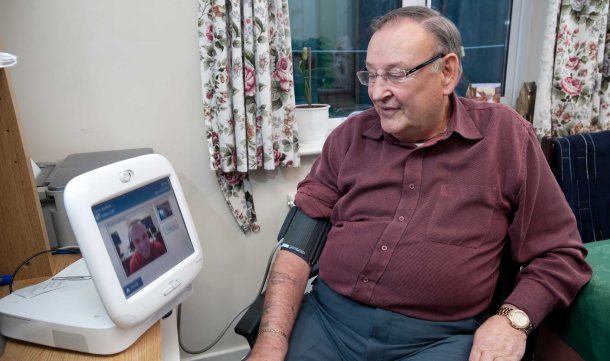NHS telehealth trial for heart patients gives "new lease of life"

Home monitoring lets patients send health data via broadband
NHS patients with chronic heart failure are taking part in a telehealth trial, using home broadband to send their health data to experts who can then remotely monitor their condition.
The trial is being run by Wakefield District Community Healthcare Services (WDCHS) with BT, which is providing and managing the telehealth kit used in the trial. The aim of the trial is to reduce the number of hospital visits patients must make.

Wakefield District patient, David Ward, using the Intel Health Guide remote moniting kit at home
(Photo credit: BT)
Patients in the trial have been given an interactive personal health system (pictured above) to use at home. The device - called the Intel Health Guide (IHG) - allows them to record key health data including blood pressure, oxygen levels and weight. The data is then sent to a community nurse for analysis via the patient's broadband line.
The IHG includes a videoconferencing feature, so the nurses treating the patient can also hold remote consultations to discuss any action the patient needs to take or concerns they have. BT said the system works over standard ADSL broadband lines and does not require high-speed fibre lines. For the Wakefield trial, BT said patients' existing broadband infrastructure has been used, although it added that some new broadband lines have been installed.
WDCHS said the telehealth system enables nurses to more easily monitor and spot early warning signs that a patient's health may be deteriorating - such as rapid weight gain due to water retention, which can occur if patients with chronic heart failure don't take their medication.
Richard Brothwell is a WDCHS community heart-failure matron and one of the healthcare professionals trialling the tech. "This technology allows us to keep in touch with patients and monitor their health daily without always seeing them physically," he said in a statement. "That means we can see more patients and those taking part in the trial are telling us they find the remote monitoring very reassuring."
Patient David Ward (pictured above), who had a heart bypass 12 years ago, said the system has helped him lead as normal a life as possible.
"Because of the confidence I have in this system, I don't worry about my health like I used to. I sleep better and don't have the panic attacks I used to and I've started to walk small distances again - I'd go as far as saying it's given me a new lease of life," he said in a statement.
"It wakes me up with a 'good morning' - I open up the screen and do my key tests and within two minutes, if all is well, I'm done for the day. If not I can talk and see Richard, the community heart-failure matron, through the videoconferencing feature and he tells me what's needed. That might mean keeping a closer eye on my health that day or a slight change in my medication."
Alan Wittrick, chief executive of NHS Wakefield District, said the trust hopes the system will cut the number of trips patients need to make to hospital.
"We know that constant visits to hospital or clinics can be debilitating and we are looking to see if this trial could in the long term help to reduce the need for these," he said in a statement. "The system provides reassurance to patients that changes in their condition can be picked up through the timely analysis of data."
The trial started in June and runs until February 2011. WDCHS will then decide whether to adopt the system permanently. Factors it will take into account when making its decision include how patients and healthcare professionals respond to the system, and its value for money.